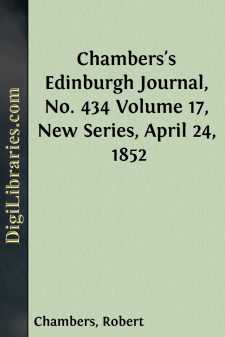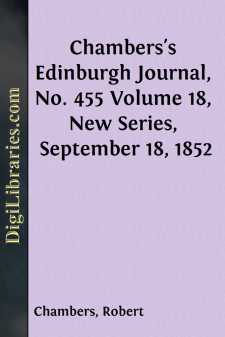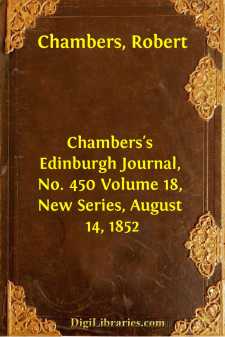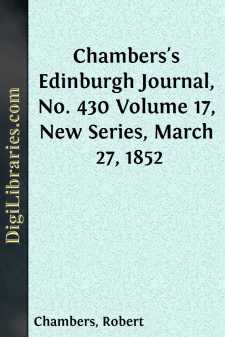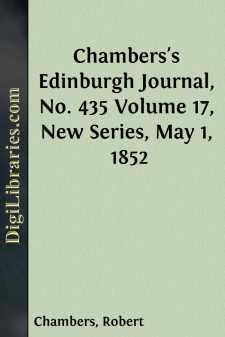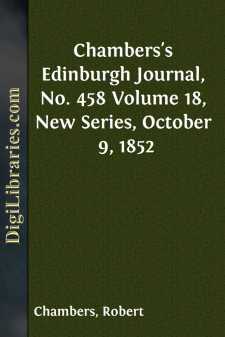Categories
- Antiques & Collectibles 13
- Architecture 36
- Art 48
- Bibles 22
- Biography & Autobiography 813
- Body, Mind & Spirit 142
- Business & Economics 28
- Children's Books 15
- Children's Fiction 12
- Computers 4
- Cooking 94
- Crafts & Hobbies 4
- Drama 346
- Education 46
- Family & Relationships 57
- Fiction 11829
- Games 19
- Gardening 17
- Health & Fitness 34
- History 1377
- House & Home 1
- Humor 147
- Juvenile Fiction 1873
- Juvenile Nonfiction 202
- Language Arts & Disciplines 88
- Law 16
- Literary Collections 686
- Literary Criticism 179
- Mathematics 13
- Medical 41
- Music 40
- Nature 179
- Non-Classifiable 1768
- Performing Arts 7
- Periodicals 1453
- Philosophy 64
- Photography 2
- Poetry 896
- Political Science 203
- Psychology 42
- Reference 154
- Religion 513
- Science 126
- Self-Help 84
- Social Science 81
- Sports & Recreation 34
- Study Aids 3
- Technology & Engineering 59
- Transportation 23
- Travel 463
- True Crime 29
Chambers's Edinburgh Journal, No. 439 Volume 17, New Series, May 29, 1852
by: Robert Chambers
Description:
Excerpt
THEREFORE AND BECAUSE.
A distinguished general-officer being appointed to a command in which he would be called on to discharge judicial as well as military duties, expressed to Lord Mansfield his apprehensions, that he would execute his office but ill in the former respect, and that his inexperience and ignorance of technical jurisprudence would prove a serious impediment to his efficient administration of justice. 'Make your mind perfectly easy,' said the great judge; 'trust to your native good sense in forming your opinions, but beware of attempting to state the grounds of your judgments. The judgment will probably be right—the argument infallibly wrong.'
This is a common case, especially with practical men, who rarely have either leisure or inclination to recall the workings of their own minds, or observe the intellectual process by which they have been conducted to any conclusion. By what they are prone to consider as a kind of instinct—if by chance they are philosophers, and delight in what old Wilson, the essayist, calls 'inkhorn terms,' they designate it 'intuition'—they arrive at a truth, but have no recollection whatever of the road they travelled to reach it, and are able neither to retrace their own steps nor indicate to another the way they came. The poet, in describing and contrasting the intellectual characteristics of the two sexes, attributes to the softer something of this instinct as a distinguishing mental peculiarity, and seems to consider it as somewhat analogous in its constitution to those animal senses by means of which the mind becomes cognisant of external objects, of their existence, their qualities, and their relations. In his view, the reasoning process is vitally and essentially distinct, as it is exercised by men and by women—
'Her rapid mind decides while his debates;Shefeelsa truth which he but calculates.'
And certainly this is a very pretty, very poetical, and very convenient way of accounting for a phenomenon that, if examined with common care, suggests a solution more accurate and complete, if not exactly so complimentary. In sober truth, a positive incapacity clearly to point out the precise manner in which a conviction has been formed, is one of the commonest of logical deficiencies, and no more to be ascribed exclusively to the softer sex, than it is an attribute of intellectual excellency in either.
When, in Euripides's beautiful play, the untranslatable Hippolylus, Phædra's nurse is made to conclude that certain men she refers to cannot be otherwise than lax in their morals, because they have finished the roofs of their houses in a very imperfect manner, her reasoning is inconsequential enough; but not more so than that of the renowned French chancellor, Michael L'Hôpital, who, when employed in negotiating a treaty between Charles IX. and our Elizabeth, insisted on the well-known line of the Latin poet—
'Et penitus toto divisos orbe Britannos,'as a reason that Calais should not be returned to the English....



